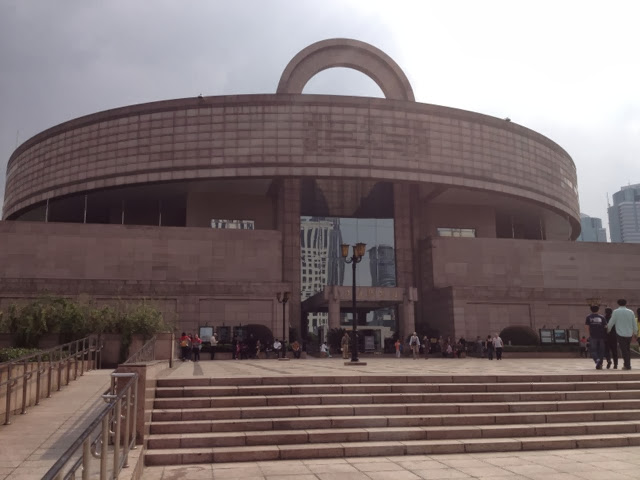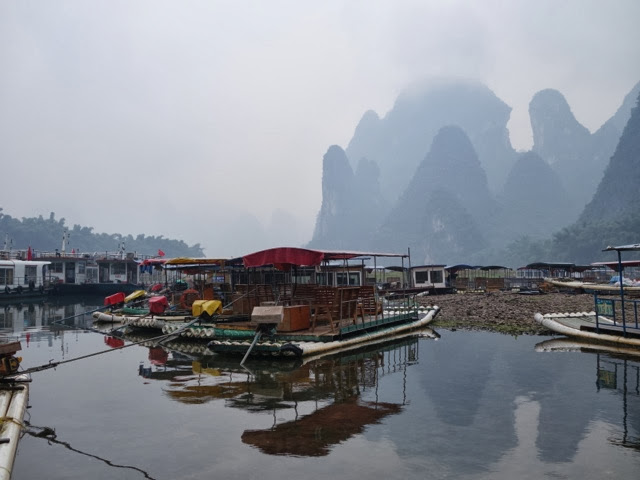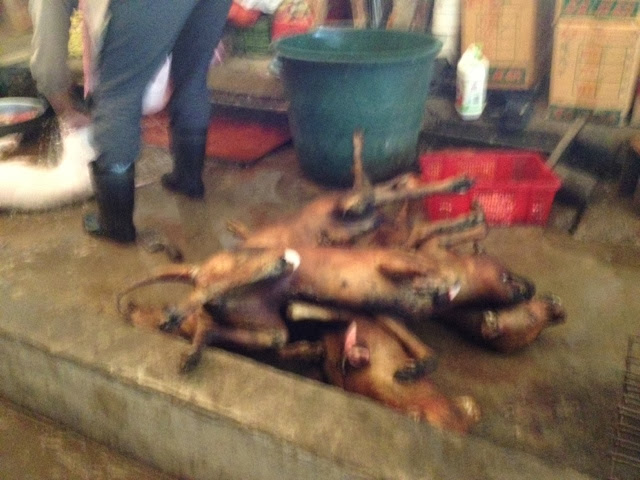And yes, there were dogs too, all of one variety (the only breed around here) fortunately already dead, but nonetheless being skinned ready for the pot.
[I originally didn't post these furtively grabbed snaps, because I know that some will find them upsetting, but I'm trying to be objective, and one man's dog is another man's pork etc. Also, If you're not yet a vegetarian, or are interested in the ethics of food production, I recommend reading "Eating Animals" by Jonathan Safran Foer ]
Meanwhile, I crossed the river Li by a ¥10 ferry, the little boat was busy with children coming home from school. There were a couple of other westerners crossing with bikes, an Israeli guy and a French girl and they took the lion's share of making faces at the excitable kids who crowded around them.
Now on the far bank, I cycled a few short km through back streets of villages, past ponds and paddy fields towards the big tourist town around here - Yangshou.
Yangshou is the southerly downstream dropping off point for the big boat tours that originate in Guilin, 35km to the north, where I started from yesterday morning. It used my be a fairly quiet town nestled amongst the picturesque karst hills that cause the river to wind in loops around them. Now it's a throng of tour parties and the tat inevitably follows. West street is the busiest pedestrian thoroughfare, the lovely old two storey buildings bedecked with stalls selling postcards, figurines, confectionary and colourful silk scarves, interrupted by the occasional pole-dancing bar and a McDonalds. I was tempted by neither, it was time to sate the rumbling in my belly that I know well could drastically impede my return speed.
It was admittedly getting a bit late now - I reckoned I had about two hours of light left, but I knew I had to get some energy, so I stopped at the Dynasty noodle bar just off West street. Parked my bike outside and ordered a delicious eggplant stew and some fried rice. I got out my paper maps and brought up google maps on my iPad. The proprietor took an interest and I indicated my plans, tracing out my return route up the west side of the river before crossing it at a small town close to Xingping. He looked on and nodded positively when I drew a bridge and pointed to its location on the map. Then a teenage boy at the table adjacent left his girlfriends and gestured if he could join me at my table. I welcomed him and he sat opposite me, obscuring my view of my bike. If Yangshou kids are anything like Hackney kids, I thought, this could mean a long walk home for me. The girls took snaps of us on their phones while he gave the thumbs up, and poured half of his beer into a glass for me. He talked to me in Mandarin for a while as I nodded, and we chinked glasses a few times before they waved goodbye. My bike, wallet and iPad were right where I left them.
It was starting to rain again. I resolved to cycle up the west side of the river, I'd plotted a course on the maps and though I couldn't be sure, there seemed to be two three options available to get back across it to the Xingping side. If I'd been feeling less brave, or had to travel the following day, at this point I would have turned around and gone back the way I came. But I didn't, I wanted to see something new so I took the gamble.
A few kilometres north, I began to get a little more nervous, I'd made a couple of minor wrong turns, and stopped twice to cross reference road signs with Chinese pictograms on the maps, but was back on track. I wanted to get across the river and back onto the road familiar from my outward journey before losing too much light. The heavy clouds though brought in the dusk much quicker and by the time I got to Pobutang, the village where the maps indicated a crossing it was pretty much dark. I parked my bike and walked down the stone steps to the river. There was no bridge here, just a lot of moored bamboos and a big tourist boat.
Standing on the shale beach, I pointed my head torch at the map. The line across the river must indicate a ferry crossing, but there was no ferryman left here, they'd all retired for the night. I considered my options. Wade/swim across? An almost instant no - too wide, too fast, too deep, too dark, and besides I couldn't really make out anymore than jungle on the opposite bank, if there was a connecting path or a road there, it was not visible. Further up river there was another possible crossing, but if there wasn't a bridge here, there wouldn't be one there. Cycle back the way I came? Too far, too dark, if I rode slowly, with my torch it would take til past midnight.
I left the bank and went back up the steps. I reasoned if I could find a boatman, I could convince them with a few yuan to give me a quick ferry to the other side. They're probably all drinking in a tiny village bar, exchanging stories of idiot tourists, I thought. This village of Pobutang though was tiny, no bars, no shops, no public buildings of any kind that I could see.
The first house that I came to was tiny, the door was open and I could see two adults and a child sitting round a stove in the floor. I was to interrupt dinner. With a big smile, sign language and map in hand, I tried best I could to communicate my problem and determine where I could find a crossing. Spectacles were unfolded and the map perused briefly under a bare bulb before I was given short shrift and shown the door. I was well and truly up shit creek.
Round the corner, another house, much larger, perhaps semi-detached, front door wide open. Again, it's dinner time, a family of five sitting round a stove on a low table. My best Ni Hao Ma was returned and I was gestured in. Mum, Dad, two boys less than five, a girl perhaps 8 or 9 and grandmother were there. I was immediately offered food and drink, before I'd had a chance to explain myself. I indicated my belly was already full, and besides I really had to get going, it was late and it was dark outside, I just had to find my way. They put in a reply - it's late, it's dark, you won't find your way. I was offered a small stool to sit on, I declined, I kept my jacket on, I really had to be going. But it's too dark, Mum put her hand over eyes and gestured outside. Yup, she was right, it was pretty black out there. Sit down, have some food they insist. I got my map out, and a pen, on it I drew a bridge, a nice medieval stone arched bridge. Confused looks all round. It looks like a bridge to me. I drew a bike going over the bridge, and a river flowing gracefully below. They're still not getting it, and I'm glad I'm not playing Pictionary. 'Where's the bloody bridge?' I think, knowing well now that a tiny settlement like this couldn't feasibly justify a bridge big enough to cross that river and the big boats that it carries.
Grandma looks at me kindly, she points to me, puts her palms together and lays her face upon them and closes her eyes. I look around the room, bare concrete walls, floor and ceiling, one wooden chair and five tiny wooden stools. Not much in the way of soft furnishings here, nothing in fact, unless you count the spiders webs. I really, really don't want to sleep here. Not because of the meagre comforts - lord knows I've happily slept in much, much worse surroundings - it's more the social awkwardness of being utterly reliant on them, with no viable method of transmitting or receiving information, practical or theoretical; or judging the delicate balance of an etiquette to which I was unaccustomed.
At this point I am feeling completely and utterly outside my comfort zone. Tired and confused and dismayed at thought of not getting back to my lovely prepaid room at the hostel. This family were offering me food, and drink, and shelter and my churlishness was met with smiles from Mum and the kids. This is turning into rather more of adventure than I'd planned for. Then the daughter brings me a piece of paper, on it she's written "my father carries you tomorrow". Gestures of sleeping are repeated and I gradually acquiesce. Just then I remember I've got the phone number of the hostel, they speak Mandarin and quite good English. I called them and tried to explain my predicament, Dad gets on the phone and has a long chat. That TMobile bill is going to hurt. The phone is returned to me and I establish that I'm welcome to stay there, for a small fee and Dad, the 'driver' will get me back in the morning. It seems he's the owner/operator of one of the little bamboo rafts that we took to get down here.
With that agreed and all parties seemingly happy, I feel a little happier. I settle on a wooden bed base in the corner of this front room and look through the kids' English school workbooks. The girl and the elder boy sit either side of me. We take turns in reading sentences and I try to help with pronunciation. We go through the alphabet a couple of times, though its clear that the elder daughter has only got up to M. I like to think that I'm helping them, but if I'm remembered by them it'll certainly be as an exotic uninvited stranger, rather than an inspirational transformation in their understanding of the language of international travel.
[I just heard on the news that the Chinese government is considering scaling back the importance of English language in their national curriculum]
After a few minutes of rudimentary English tuition, I lose the kids attention to the low budget samurai period soap opera playing on the TV. If you can't beat them join them I thought, and settled onto one of the wooden stools to watch the incomprehensible drama unfold. Dad offers me a cup of tea, brewed from the local leaves which have a pleasant aniseed flavour, I have one cup, and then another. Before long, it's time for bed.
All the water here comes from a tap out in the vegetable garden. Dad fills a very large plastic pail from the garden, and brings it inside. From this master supply, it is decanted using a saucepan into one of several smaller buckets each with a seperate purpose. I dont believe there's any central water boiler in the house, instead water is boiled in a kettle as required. I'm shown a large plastic bowl of the kind we may do the dishes in, its filled with warm water and the elder son gives me a towel and mimes washing his face. He shows me to a tiny room behind the kitchen area of the main room. This is the bathroom, again just blank damp concrete, no decoration at all. The only useful thing in it is a squat latrine, but this is blocked with two wall bricks, I readily take this as a sign not to use it. Instead I brush my teeth and wash my (still mud-spattered) face in the bowl.
While doing so, I hear a rustling noise behind me, I turn and see a frog in the corner. As it jumps towards me, I jump forward and find myself nose to nose with an enormous spider on the wall, body about the size of an AA battery, legs the span of a lady's hand. I hastily bounce back and notice its equally sizeable buddy eyeballing me from the low ceiling. I empty the bowl into a drain in the corner and a beat a retreat to the relative safety of a bed.
I say good nights and close the door behind me, wondering just how I got here and worrying whether I've displaced anyone from their own bed.
Adventures only really happen when things don't go as expected.






















































